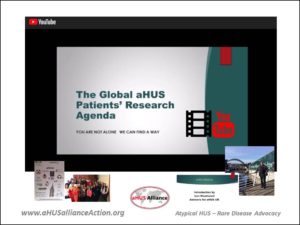
An International Project
developed and adopted by the aHUS Alliance
Agenda released Rare Disease Day 2019 (28 Feb)
The aHUS Alliance, an umbrella group of aHUS advocates and patient groups in over 30 nations, launched its aHUS Global Patients’ Research Agenda on Rare Disease Day 2019. An international project developed over 4 years, the aHUS Global Patients’ Research Agenda lists 15 central questions grouped into 5 main categories: Causes and Precautions, Diagnosis, Treatment, Impact: Clinical/Psychological, and Impact: Socio-Economic.
The aHUS Global Patients’ Research Agenda was crafted using input from an alliance affiliates group in 2015, survey data from the 2016 aHUS Global Poll, and international entries from aHUS patients and caregivers for the aHUS Alliance 2017 Rare Disease Day video project.
Click the link below to download a printable version:
aHUS Global Patients’ Research Agenda, PDF
ES: Spanish Language Version
![]()
Lea esta página en español
Agenda Investigación de Pacientes Globales de SHUa
Descargue la Agenda pdf en español
ES: aHUS Patients’ Global Research Agenda.pdf
(Translation courtesy of Merche Forte, Spain)
FR: French Language Version
![]()
Programme de Recherche Mondial pour les Patients SHUa
Cliquez sur le lien ci-dessous afin de télécharger une version imprimable
FR aHUS Global Patients’ Research Agenda pdf
(Translation courtesy of Nicolas Mullier, France)
Click the Image – Watch the YouTube Video
The Global aHUS Patients’ Research Agenda
What is it & Why is it Important?
( YouTube: PresentIon by Len Woodward, UK )
![]()
aHUS Global Patients’ Research Agenda
aHUS Causes and Precautions
1.1 Are the predisposing genetic and triggering factors of aHUS fully catalogued and understood and will it help to know how variable are the risks of these between individuals?
1.2 When it comes to genetic testing of aHUS family members what is best – to know or not to know -and what can be done with the knowledge?
aHUS Diagnosis
2.1 Is there a diagnosis sweet spot which can be found before a developing thrombotic microangiopathy turns into a catastrophic episode of aHUS?
aHUS Treatment
3.1 Is there an optimal way in which a complement inhibitor can be delivered to suit an individual’s need?
3.2 Can a clinically effective therapy be developed that is affordable for all aHUS patients?
3.3 Is it more cost effective, as well as clinically effective, for the management of an aHUS patient’s treatment to undertake genetic testing?
3.4 Can a complement inhibitor be stopped safely when not needed by some aHUS patients and what makes them different?
3.5 Is there a significant difference in outcome between having a complement inhibitor before or after a kidney transplant?
3.6 Will there be a cure eventually?
aHUS Impact: Clinical/Psychological
4.1 Are there long-term studies of outcomes of those in remission whether treated by a complement inhibitor or not?
4.2 Can the side effects of treatment using a complement inhibitor be distinguished from those temporary and permanent ongoing ailments which follow initial onset?
4.3 Does the anxiety and self-esteem of aHUS patients vary significantly between treatment types and what can be done to reduce and boost them respectively?
aHUS Impact: Socio-Economic
5.1 How does living with aHUS impact on education and work?
5.2 Do aHUS families have all the correct information to make informed family planning decisions?
5.3 How many aHUS patients are there in my local area, my country and the world and how do they differ?
Background on the aHUS Global Patients’ Research Agenda
aHUS Global Patients’ Research Agenda Article (Agenda details & background)
Video about the Agenda, A presentation by Len Woodward (UK)
Interim aHUS Patients Agenda Article (Preliminary agenda & further background)


